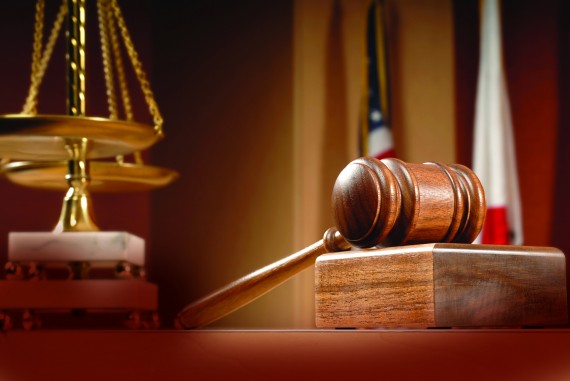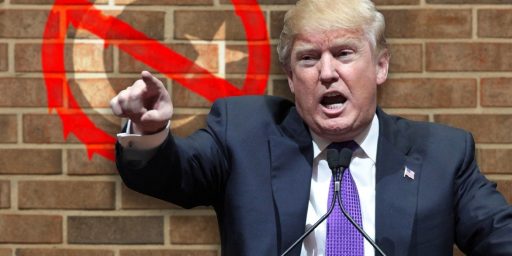Hawaii Sues Trump Administration Over Renewed Muslim Ban Executive Order
Hawaii is the first state to challenge the Trump Administration's revised Muslim travel ban.
The Attorney General of Hawaii has announced that his state intends to sue the Trump Administration in response to the new Executive Order banning much travel from six majority-Muslim nations, the first of what are likely to be several challenges to a new order drafted in response to similar lawsuits from other states in response to the original order:
President Trump’s revised executive order barring citizens of six predominantly Muslim countries from traveling to the United States confronted its first legal challenge late Tuesday, the day after it was signed, when the State of Hawaii asked a federal judge to block it temporarily.
The court filing from the office of the attorney general of Hawaii, Doug Chin, a Democrat, may signal a wave of legal assaults on Mr. Trump’s second take on the travel ban, which preserves the fundamentals of the first while lifting restrictions on Iraqis, green card holders and lawful permanent residents, and people who are already approved to enter the United States.
The White House revised the order with an eye toward avoiding the chaos that rippled through airports after the first version was signed in late January. It also sought to patch up the first executive order’s legal vulnerabilities, which became apparent after a federal judge in Washington State issued a nationwide injunction against the travel ban.
Lawyers for Hawaii, which is also being represented by the law firm Hogan Lovells, argue that the administration’s changes are not much of an improvement. The latest filing noted that one of Mr. Trump’s top aides told Fox News in late February that while the new directive would address the legal issues that had arisen around the ban, “you’re still going to have the same basic policy outcome for the country.”
Neal Katyal, a former acting solicitor general in the Obama administration who heads the Hogan Lovells team, said Tuesday, “We absolutely agree with the president’s senior adviser, Stephen Miller, who said this executive order is the same as the last one.” Mr. Katyal said, “The same legal problems that infected the first one infect version 2.0.”
Still, some legal specialists say the revisions may help the administration dodge the legal pitfalls of the initial ban.
In the court papers, lawyers for the state argued that the new order discriminates against Muslims, even if it affects fewer people than the previous one.
“Given that the new executive order began life as a ‘Muslim ban,’ its implementation also means that the state will be forced to tolerate a policy that disfavors one religion,” the lawyers wrote. They listed 15 separate instances in which Mr. Trump or his advisers tied the travel restrictions to Muslims or Islam.
In addition, the state said, the ban “is inflicting immediate damage to Hawaii’s economy, educational institutions, and tourism industry; and it is subjecting a portion of the state’s citizens to second-class treatment and discrimination, while denying all Hawaii residents the benefits of an inclusive and pluralistic society.”
It also said Hawaiians and other Americans would be cut off from family members living in the six countries affected by the ban. One plaintiff in the lawsuit is Ismail Elshikh, imam of the Muslim Association of Hawaii and an American citizen of Egyptian descent, whose Syrian mother-in-law will most likely be barred from visiting the family in Hawaii.
A spokeswoman for the Justice Department declined to comment on Wednesday.
Lyle Denniston has the details:
The elimination of language about religion, the state of Hawaii is claiming in its new challenge, did not make the restrictions any less a “ban on Muslims” than had been the case with the first order. The second order, it argued, “began life as a ‘Muslim ban.’ ” It based that claim on a series of statements by Donald Trump as a presidential candidate and as president, and on statements by his close associates, indicating that the target of the efforts was to be Muslims.
Thus, the first legal claim in the state’s new lawsuit is that the order violates the Constitution’s First Amendment religion clauses, because it and the statements of the president and others show that the order “has the effect of disfavoring Islam.”
The state seeks to bolster its claim about a religious content and to support its arguments about a human impact by adding to the case, as an individual challenger, an Egyptian-born U.S. citizen, Ismail Elshikh, who is the imam of a mosque that serves a group of Hawaii’s Muslims. The imam and his citizen wife and five children are unable to arrange a visit for his wife’s mother, who is Syrian now living in Syria, because she does not have a current visa and thus is banned by the new presidential order, according to the legal complaint.
Hawaii’s lawsuit also makes these claims about the second presidential order: it violates constitutional guarantees of legal equality due to discrimination based on nationality as well as on religion, violates constitutional guarantees of a right to travel internationally, violates constitutional guarantees of fair procedures in determining who may travel in and out of this country, violates federal immigration laws, violates a federal law protecting religious freedom from government interference, exceeds the government’s powers under immigration laws, and was published illegally because the public had no chance to react to it before it was issued.
The lawsuit asks specifically that the judge strike down the 90-day suspension of travel to the U.S. by nationals of six Mideast nations, as well as the order’s 120-day suspension of travel to the U.S. by refugees from any country. And it asks the judge to forbid enforcement “across the nation.”
The filing came in a lawsuit that Hawaii had already filed challenging the original Trump Executive Order, which has now effectively been revoked. Instead of dismissing the initial lawsuit and filing a new one, though, Hawaii is proposing to amend its lawsuit to address the new order and to set the matter down for a briefing and argument schedule for an injunction that would prevent the order from going into effect prior to its March 16th effective date. The Amended Complaint has already been filed and is embedded below. Briefing from the Federal Government will be due March 13th, and the State of Hawaii will file and brief in response on March 14th. There will be a hearing on the application for a temporary injunction on March 15th, the day before the Executive Order is scheduled to go into effect. Assuming that all of this is accepted by the Court, a ruling from the Federal District Court could come relatively quickly and the Hawaii case could end up being the first official ruling on whether or not the Administration has adequately addressed the legal deficiencies in the original Executive Order. As with the Washington Federal Court ruling that put the original order on hold, any ruling from the Court in Hawaii would be appealable to the Ninth Circuit Court of Appeals, although not necessarily to the same panel of Judges that heard that case and ultimately ruled against the Trump Administration.
As I noted when the revised order was signed on Monday, while the revised order does deal with some of the more obvious problems with the initial order, such as the fact that it was applicable to Permanent Residents and people who had already had their visas approved or otherwise been cleared by American security checks, there remain a number of other deficiencies. Primary among these, of course, is the fact that there appears to be little if any evidentiary support for the decision to limit the order to the six countries in question while excluding other Muslim nations in the region that have been the source of planned and executed terror attacks in the United States such as Egypt, Saudi Arabia, United Arab Emirates, Pakistan, and Afghanistan. Additionally, the new order will still have to overcome the argument that it aims to ban travel based on religion and the evidence in support of that contention that can be found in the words of President Trump himself during the campaign, and in the words of surrogates such as Rudy Giuliani after he became President. Giuliani, as you may recall, said on television shortly after the original order was released that Trump and he talked before the order,
Here’s the Amendment Complaint:
Hawaii v Trump by Doug Mataconis on Scribd






Game on.
Your argument presumes facts not in evidence. This is not designed to prevent terror attacks. This is simply red meat for the base, a group of people who see Trump fighting the judicial branch to keep foreigner/terrorists out of “our” country.
There is no desire to address the core problem, because if there was, policy would look an awful lot like Obama’s doctrine (which kept us safe for 8 years).
OT a little — sorry, but this is just really bugging me and I think it is something Doug might have some insight on.
Why are people not upset that companies have waited until now to announce moving jobs to the U.S. or keeping them here? None of these plans are new or spur of the moment — they have been in the works for a while.
Trump’s EO has potentially signaled the end of my profession in the U.S. with this immigration move and his encouragement of the nativists. It pisses me off. I just wonder why people aren’t more pissed off that companies sat on the sidelines,sitting on their hands until a republican was elected. Had a republican not been elected, would they have made the same moves without the fanfare? Or would they have delayed those plans for even longer?
Also somewhat off topic: Khizr Khan has withdrawn as a speaker from a conference in Canada out of concern that his “travel privileges” are “under review”. This happened about 2- or 3- days ago and no more information has been released.
There’s a bad moon on the rise.
The due process and freedom of religion claims have merit, but this “economic damage” argument seems a stretch to me. Any federal regulation that bans activity X will necessarily diminish the financial situation of those who were formerly profiting from engaging in X. If that “economic damage” is enough to overturn a law, then what federal law can’t be overturned?
@JohnMcC: “Khizr Khan has withdrawn as a speaker from a conference in Canada out of concern that his “travel privileges” are “under review””
http://news.nationalpost.com/news/world/khizr-khans-reason-for-cancelling-his-scheduled-speech-in-toronto-is-beginning-to-unravel
@Lynn:
Muhammad Ali, Jr. and his mother – both US citizens traveling on US passports – were detained for several hours at a Florida airport after returning home from Jamaica and both were questioned about their religion
Khan has a legitimate reason to be concerned.
@HarvardLaw92: Indeed. I know I would be concerned if I were Mr. Khan. In fact, I’m not sure that I would be comfortable going to Korea on my vacation next month if I weren’t caucasian, and I’ve been stopped at the border in Seattle, traveling on a US passport, because the passport officer didn’t like my signature on my declaration form (no, I’m not kidding).
Add New York, Minnesota, Washington, and Oregon to the list.